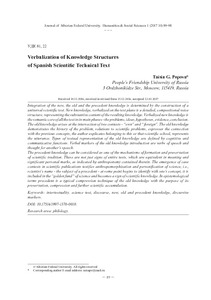Показать сокращенную информацию
Verbalization of Knowledge Structures of Spanish Scientific Technical Text
| Автор | Popova, Taisia G. | en |
| Автор | Попова, Т.Г. | ru_RU |
| Дата внесения | 2017-01-30T07:55:50Z | |
| Дата, когда ресурс стал доступен | 2017-01-30T07:55:50Z | |
| Дата публикации | 2017-01 | |
| URI (для ссылок/цитирований) | https://elib.sfu-kras.ru/handle/2311/30762 | |
| Аннотация | Integration of the new, the old and the precedent knowledge is determined by the construction of a universal scientific text. New knowledge, verbalized on the text plane is a detailed, compositional voice structure, representing the substantive content of the resulting knowledge. Verbalized new knowledge is the semantic core of all the text in its main phases - the problems, ideas, hypotheses, evidence, conclusion. The old knowledge arises at the intersection of two contexts - “own” and “foreign”. The old knowledge demonstrates the history of the problem, solutions to scientific problems, expresses the connection with the previous concepts, the author explicates belonging to this or that scientific school, represents the utterance. Types of textual representation of the old knowledge are defined by cognitive and communicative functions. Verbal markers of the old knowledge introduction are verbs of speech and thought for another’s speech. The precedent knowledge can be considered as one of the mechanisms of formation and preservation of scientific tradition. These are not just signs of entire texts, which are equivalent in meaning and significant personal marks, as indicated by anthroponomy contained therein. The emergence of case contexts in scientific publications testifies anthropomorphization and personification of science, i.e., scientist’s name - the subject of a precedent - at some point begins to identify with one’s concept, it is included in the “golden fund” of science and becomes a sign of scientific knowledge. In epistemological terms precedent is a typical compression technique of the old knowledge with the purpose of its preservation, compression and further scientific accumulation | en |
| Аннотация | Интеграция нового, старого и прецедентного знания определяется универсальным построением научного текста. Новое знание, вербализированное на плоскости текста, представляет собой развернутую композиционную речевую структуру, репрезентирующую предметное содержание полученного знания. Вербализированное новое знание является смысловым стержнем всего текста в его основных фазах – проблемы, идеи, гипотезы, доказательства, вывода. Старое знание возникает на пересечении двух контекстов – «своего» и «чужого». Старое знание демонстрирует истории вопроса, способы решения научной проблемы, выражает связь с предшествующими концепциями, эксплицирует принадлежность автора к той или иной научной школе, воспроизводит чужое высказывание. Типы текстовой репрезентации старого знания определяются когнитивными и коммуникативными функциями. Вербальными маркерами ввода старого знания служат глаголы речи и мысли для чужого высказывания. Прецедентное знание можно рассматривать как один из механизмов формирования и сохранения научной традиции. Эти не просто знаки целых текстов, которым они эквивалентны по смыслу, а значимые личностные знаки, на что указывают содержащиеся в них антропонимы. Появление прецедентных контекстов в научных публикациях свидетельствует об антропоморфизации и персонификации науки, т.е. имя ученого – субъекта прецедента – в какой-то момент начинает отождествляться с его концепцией, входит в “золотой фонд” науки и становится знаком самого научного знания. В гносеологическом плане прецедент является типичным приемом сжатия старого знания с целью его сохранения, уплотнения и дальнейшего научного накопления | ru_RU |
| Язык | en | en |
| Издатель | Сибирский федеральный университет. Siberian Federal University | en |
| Тема | intertextuality | en |
| Тема | science text | en |
| Тема | discourse | en |
| Тема | new | en |
| Тема | old and precedent knowledge | en |
| Тема | discursive markers | en |
| Тема | интертекстуальность | ru_RU |
| Тема | научный текст | ru_RU |
| Тема | дискурс | ru_RU |
| Тема | новое знание | ru_RU |
| Тема | старое знание | ru_RU |
| Тема | прецедентное здание | ru_RU |
| Тема | дискурсивные маркеры | ru_RU |
| Название | Verbalization of Knowledge Structures of Spanish Scientific Technical Text | en |
| Альтернативное название | Вербализация знаний в испанском научно-техническом тексте | ru_RU |
| Тип | Journal Article | |
| Тип | Published Journal Article | |
| Контакты автора | Popova, Taisia G.: People’s Friendship University of Russia 3 Ordzhonikidze Str., Moscow, 115419, Russia; taisapo@mail.ru | en |
| Контакты автора | Попова, Т.Г.: Российский университет дружбы народов Россия, 115419, Москва, ул. Орджоникидзе, 3 | ru_RU |
| Страницы | 89-98 | |
| Журнал | Журнал Сибирского федерального университета. Гуманитарные науки. Journal of Siberian Federal University. Humanities & Social Sciences;2017 10 (1) | en |

